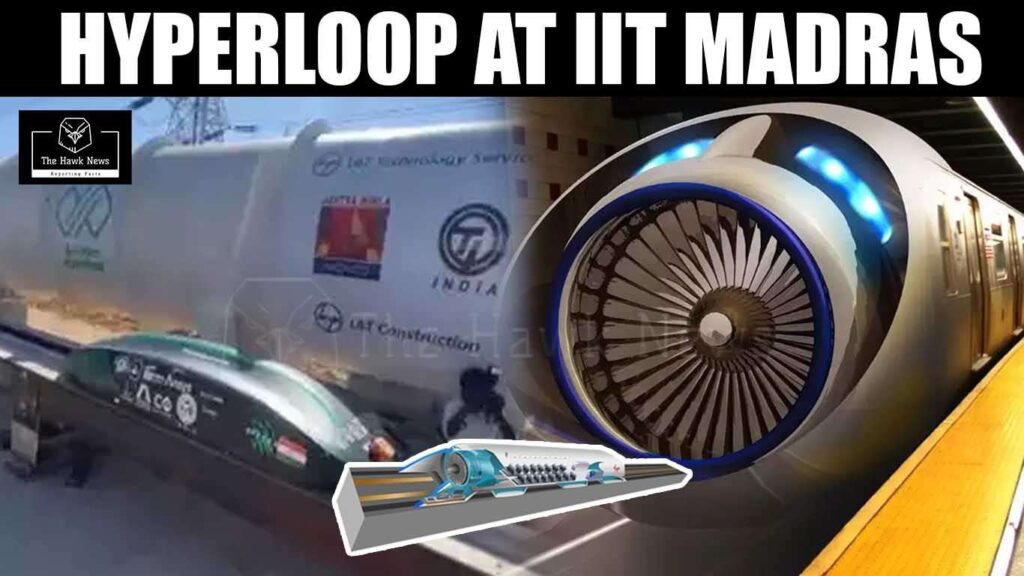
India is driving forward Hyperloop technology, a groundbreaking mode of transport set to transform the upcoming future of high-speed travel. This advanced system makes sure that passenger and cargo pods move through low-pressure tubes at speeds of up to 1,200 km/h, acceleratingly shortening the traveling time between cities. Through repeated research and development, India is developing as a global frontrunner in this transformative transportation technology.
India’s Transport Evolution: The Hyperloop Era:
The Hyperloop is frequently referred to as the “fifth mode of transportation,” joining road, rail, water, and air. Hyperloop was initially introduced by entrepreneur Elon Musk; this transformative concept has earned global attention. By using magnetic levitation and near-vacuum tubes, the system minimizes air resistance and friction, allowing for ultra-fast, energy-efficient travel. If Hyperloop is perfectly executed, Hyperloop technology could dramatically reduce travel times between major Indian cities. As an example, a journey from Mumbai to Pune, which mostly takes about three hours by car or train, could be cut down to just 25 minutes with Hyperloop. This efficiency has the potential to transform both passenger travel and cargo transport, cutting logistics costs and optimizing supply chain operations.
Hyperloop Testing Takes Off at IIT Madras:
An important development in India’s Hyperloop development is the execution of a 410-meter-long test track at the Indian Institute of Technology Madras (IIT Madras) in Chennai. As of now, the longest Hyperloop test track in Asia, this facility is assumed to become the world’s longest Hyperloop test tube in the upcoming future. This test track will allow researchers to explore high-speed pod dynamics, safety protocols, and viability assessments by advancing and validating indigenous Hyperloop technologies. India seeks to minimize reliance on foreign expertise and develop cost-effective solutions tailored to local demands.
Pioneering India’s Hyperloop Network:
Not only for experimental research, India is now planning to execute Hyperloop for commercial transportation. A 50-kilometer Hyperloop corridor is being progressed with the help of Indian Railways and other stakeholders. Once the Hyperloop is completed, this project could serve as an extraordinary supermodel for the upcoming Hyperloop network, which is going to span across the countries. This plan is mainly planned to reduce travel time between main locations like Mumbai, Delhi, etc., which can enable future expansion of hyperloop locations and routes. If the plan succeeds, longer routes like Mumbai-Pune, Bengaluru-Chennai, and Delhi-Varanasi will also adopt the Hyperloop technology project. This establishment has the power to revolutionize India’s transportation system.
Collaborative Forces Shaping Hyperloop:
The Indian government research institute and other private companies are actively exploring the process of hyperloop technology. The Ministry of Railways is analysing the execution and its effectiveness. Hyperloop, EarthX, and other startups are the contributing channels for this upcoming project. Which also includes global companies like Virgin Hyperloop, showing interest in our Indian projects. With this collaboration of national to international experts’ companies, the process can complete soon before the expected plan; this will help in the speed development of transportation.
Obstacles and the Path Forward:
Establishing Hyperloop in India will face too many problems. High infrastructure costs and land acquisition issues could make large-scale development difficult. Due to insufficiency of regulations and delays in approvals, progress may slow down, while achieving safety certifications remains a major battle. Where Hyperloop is still an unproven technology, its feasibility for commercial use is unclear. Energy requirements for maintaining near-vacuum conditions could be more important. Environmental factors like monsoons, extreme temperatures, and seismic activity may affect its stability. The economic factor is a major concern on the approach of Hyperloop project implementation, as high costs could lead to expensive ticket pricing. It must also compete with existing transport systems, including high-speed rail and air travel. In the end, the successful implementation will depend largely on public acceptance and a well-prepared workforce.
Future Outlook: India’s advancement in Hyperloop technology represents an important step towards transforming transportation. Following up with continuous research, government initiatives, and private sector collaboration, the nation is emerging as a major contributor to short-time transportation facility. While obstacles like high costs, regulatory challenges, and environmental concerns persist, strategic planning and innovation can pave the way forward. A successful Hyperloop implementation could modernize travel, streamline logistics, and boost economic development. In the end, its success will rely on public acceptance, infrastructure preparedness, and technological progress.